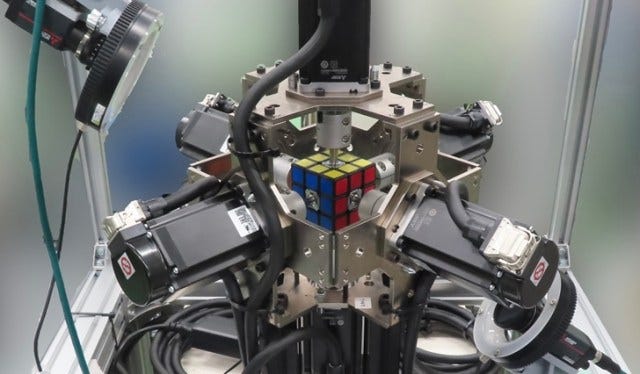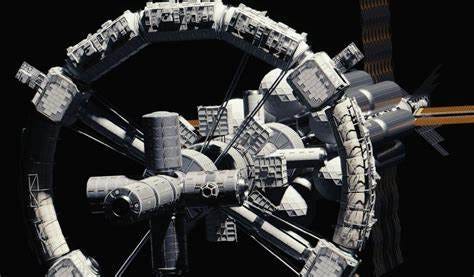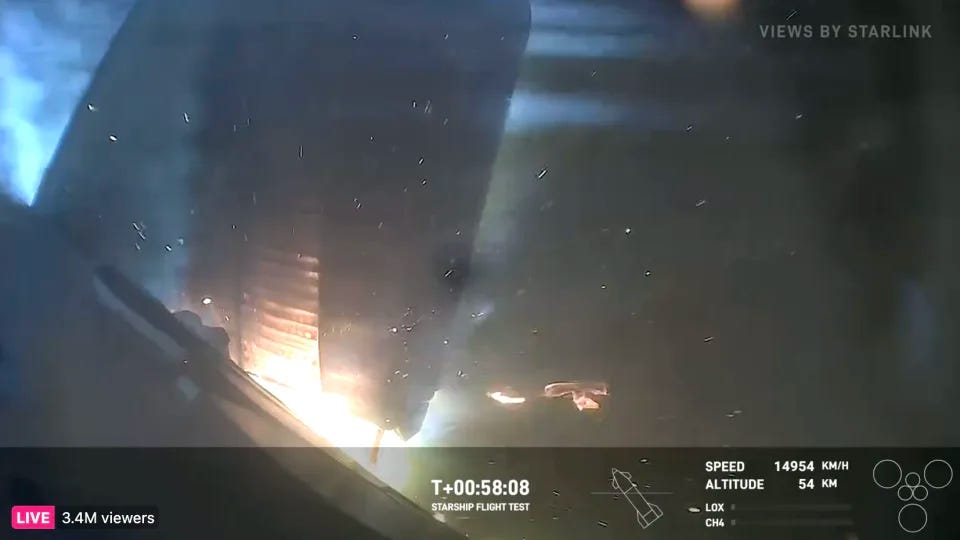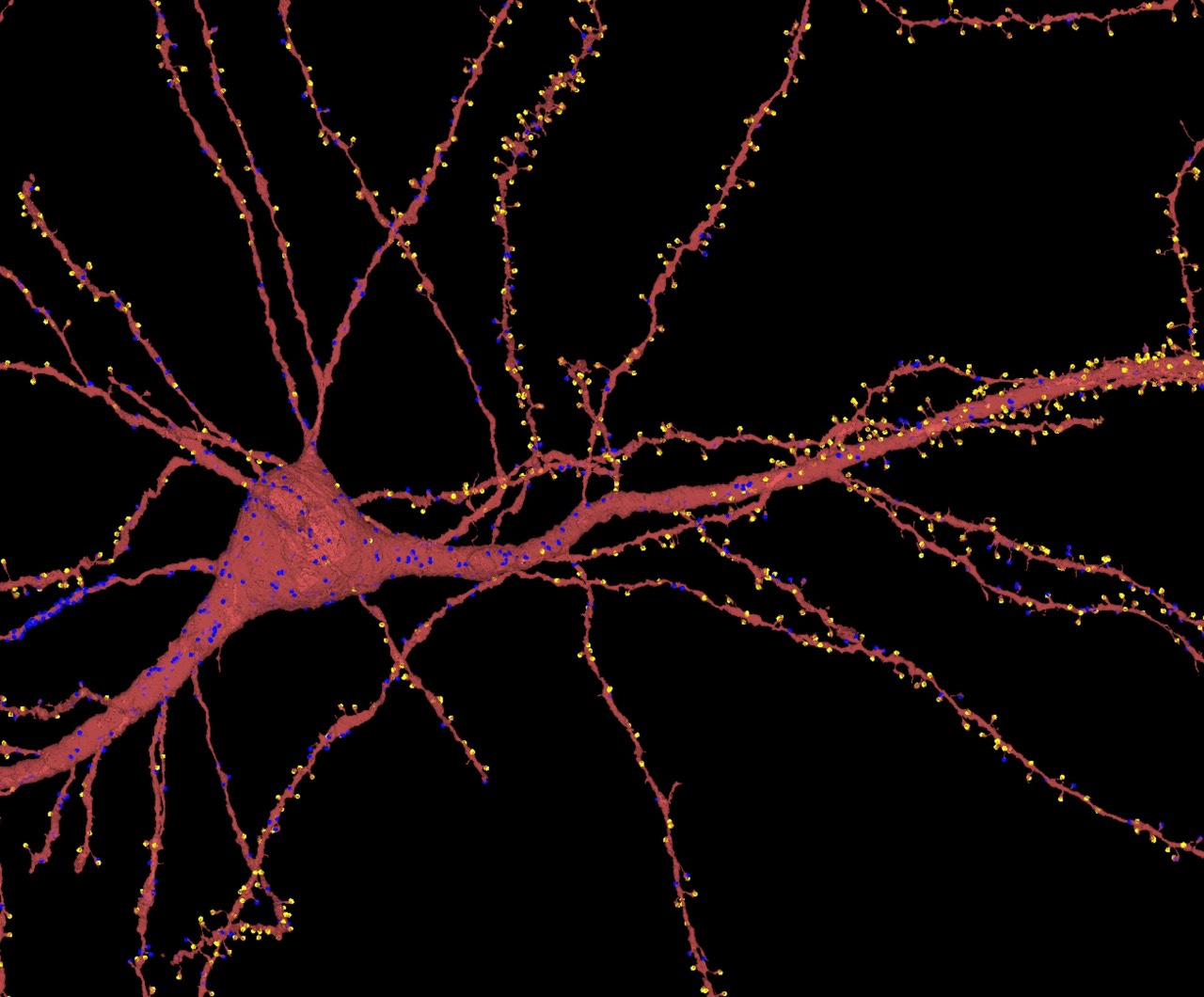#42: AI everywhere, Bio-processor, Starship, Dark Side of Moon, Google Leak, Bisons, Human Brain Map, and More!
Hi everyone!
Welcome to the 42nd edition of this newsletter! As fans of The Hitchhiker's Guide to the Galaxy know, 42 is the answer to the ultimate question of life, the universe, and everything.
So, in honor of this cosmic milestone, I wrote the longest newsletter ever. In fact, there’s so much juicy content that I will cut the introduction here.
Enjoy this one!
Xavier
🤓 Cool Stuff I Found on the Internet
Iceberger
This website allows you to draw an iceberg and see if it floats. The simulation isn’t perfect, but it’s fun to play with.
Robot solves Rubik's Cube in 0.305 seconds
Mitsubishi Electric developed a robot that now holds the Guinness World Record for the fastest time to solve a Rubik's cube at just 0.305 seconds. The servo motors can perform a 90-degree turn in 0,009 seconds, a marvel in precision motor control.
Google's Secret Search Algorithms Leaked?
A recent leak of internal documentation revealed 14,000 signals Google uses to rank its search results. It reveals that Google is keeping track of user clicks, site authority, and even Chrome user data. However, the document doesn't reveal how these signals are weighted in search, or if they are included at all. Google has confirmed the documents are real.
At age 30, you'll stop finding new music
Studies have shown that our music preferences are formed during our teenage years, a time when music plays a critical role in emotion and identity formation. Data analyses suggest that by age 31, many individuals find their musical tastes have solidified, making new music discovery less common.
Agar art: painting with bacteria
Professor David Westenberg engages in a unique blend of science and art known as agar art, creating vibrant designs using pigmented bacteria. This discipline originated nearly a century ago with Alexander Fleming, the discoverer of penicillin.
🧠🤖 Artificial intelligence
Apple Intelligence
As expected, Apple announced deep integration of AI in their upcoming OS updates. For privacy reasons, Apple will perform most processing on your device, while their datacenters will handle more complex tasks. ChatGPT also gets integrated into the OS, and Siri is supercharged with the ability to draw on “your personal context”. These updates were well received, except by Elon Musk, who vowed to ban Apple devices in his companies if they send data to OpenAI.
AI-discovered drugs are acing trials
Latest analysis shows AI is excellent at identifying molecules with promising drug-like properties. In Phase 1 trials, AI-discovered drugs boast an 80-90% success rate, far exceeding human averages of 40-65%.
Bio-processor made from human brain cells
FinalSpark is making processors from human brain cells! These biological processors could dramatically reduce the energy demands of computing. Many challenges still need to be overcome, though. These chips are experimental, slow, and the brain cells only live for around 100 days.
Microsoft: 75% of workers use AI
According to Microsoft and LinkedIn, 75% of knowledge workers are using generative AI to help them in their day-to-day activities. That is an enormous number, but I wonder how many of those are using AI in a structural, systemic way.
Recall: Creepy Microsoft, or nifty feature?
Microsoft announced that Windows 11 will constantly take screenshots of what you're doing and index them. While all processing happens locally on your PC, many have raised concerns over privacy as this feature can also capture sensitive activities, while others note it uses weak encryption. In response, Microsoft delayed the feature and promises changes to address concerns..
👽 Space
Rotating spacecraft
One problem with deep space missions is the impact of weightlessness on astronaut health. Over months, muscles will atrophy, bone density will decrease, cardiovascular fitness drops, and the list goes on. The solution? Create artificial gravity by rotating a spacecraft! A 25 meter donut-shaped craft spinning 6 times per minute is enough to generate the same gravity as here on Earth!
Chang'e 6 lands on far side of the Moon
China is the first country to soft land a craft on the Moon’s far side. Chang’e 6 will drill to collect lunar regolith and deliver it to the Chang’e 6 orbiter. If all goes well, the sample will arrive back on Earth later this month. Scientists will intensely study them as we’re still unsure why the Moon’s far side is heavily cratered and lacks large plains that are prominent on the near side.
Starship launch successful
Fourth time’s the charm! SpaceX’s Super Heavy booster propelled Starship to orbit, and both survived atmospheric reentry and achieved soft splashdown. Starship’s health shield took a heavy beating though, as did the flaps. The company is busy upgrading the heat shield and is planning a fifth test flight “in about a month”.
⚡️ Energy & Environment
Plastic-eating fungus
Scientists have discovered a plastic-eating fungus in the Great Pacific Garbage Patch. More specifically, it feeds of UV-exposed polyethylene, the most common plastic found in consumer products. While it's amazing to see that nature is evolving to fix our pollution, we should still get our act together and clean up our oceans!
Microsoft's emissions shoot up
I wrote before that generative AI is using huge amounts of electricity. From 2022 to 2023, Microsoft's emissions have increased by 25% and this is attributed to "construction of more datacenters". Microsoft wants to be carbon negative by 2030, but it's now questioned if they can get there with the current boom in AI.
Bisons can capture CO2
Romania’s rewilding project reintroduced bison to the Țarcu mountains after a 200-year absence. The result? A reduction in CO2! A bison herd is estimated to remove about 54,000 tons of CO2 annually, the equivalent of 43,000 cars. Bisons don’t remove CO2 by themselves, instead, they fertilize grass and spread seeds while also compacting soil to help keep carbon locked in the ground. Thanks to the bisons, grasslands capture almost 10 times as much as carbon.
🏥 Health & Medicine
New antibiotic spares gut bacteria
Antibiotics are a marvel of modern medicine, but they can also harm the normal bacterial system our health relies on. Researchers now developed an antibiotic that targets multidrug-resistant bacteria while sparing beneficial gut microbes. More research (and trials) are needed, but it’s a significant step towards safer and better antibiotics!
1 cubic millimeter of human brain tissue
Google helped to map a small part of the human brain at nanoscale. It allows us to trace the brain's wiring and synapses, potentially offering insights in how our brains store and process information. The brain tissue was obtained during an epilepsy surgery, sliced, imaged with an electron microscope, and reconstructed with machine learning. The map (and corresponding data) is freely available, but be warned: it's 1.4 petabytes in size!







